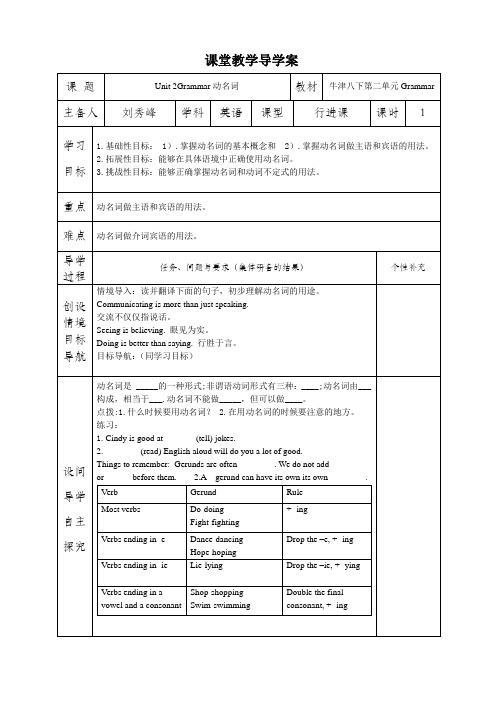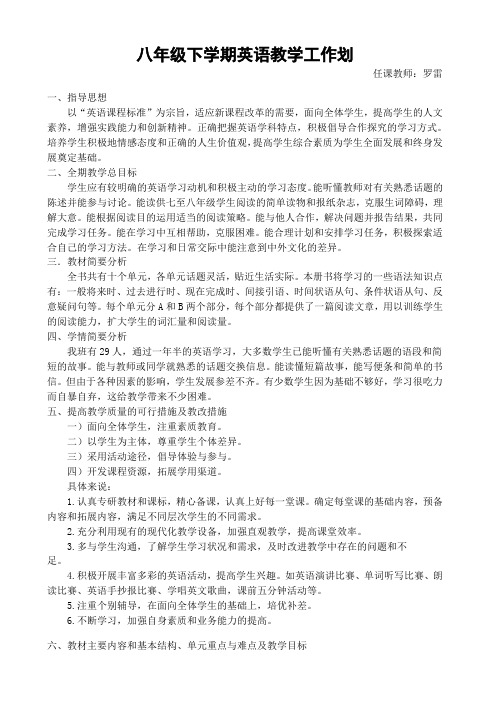人教版八下英语导学案Unit2
人教八下Unit2SectionB(1a2e)教学设计

4.学习方法:学生在学习过程中,需要教师的引导和启发。教师应关注学生的个体差异,采用多样化的教学手段,提高学生的学习效果。
5.情感态度:学生在学习过程中,可能会遇到挫折和困难。教师应关注学生的情感变化,及时给予鼓励和支持,帮助学生树立正确的成功观和价值观。
人教八下Unit2SectionB(1a2e)教学设计
一、教学目标
(一)知识与技能
本章节“人教八下Unit2 Section B(1a2e)”旨在帮助学生掌握以下知识与技能:
1.掌握本单元的关键词汇和短语,如:argue, achieve, goal, succeed, determination, effort, confident, brave, disappoint, victory等,并能熟练运用这些词汇进行日常交流。
3.增强自信心,相信自己有能力克服困难,实现自己的目标。
4.养成良好的学习习惯,树立终身学习的理念,不断提高自己的综合素质。
5.关注社会热点,了解国内外成功人士的事迹,拓宽视野,增强社会责任感。
二、学情分析
针对“人教八下Unit2 Section B(1a2e)”这一章节,考虑到学生的年龄特点和英语水平,进行以下学情分析:
三、教学重难点和教学设想
(一)教学重难点
1.重点:
(1)掌握本章节的关键词汇和短语,如:argue, achieve, goal, succeed, determination, effort, confident, brave, disappoint, victory等。
人教版英语八年级下册导学案

Unit4Section A一、学习目标:1) Important words: mad, anymore, message, suppose, hard-working2) Important phrases: watch soap operas, be supposed to do, first of all, pass on, sth. happen on …3) Important Sentences①She said she was mad at Marcia. ②She said she was having a party for Lana.③What happened on “Young Lives” last night? ④You are supposed to meet at the bus stop to return it.4) Grammar: 直接引语和间接引语二、学法指导:运用任务型学习,驱动学生掌握直接引语与间接引语之间的转化三、学习过程:Step1自学单元语法:(直接引语和间接引语)(一) 直接引语和间接引语的含义:引述别人的话时,一般采用两种形式:一是引用别人的原话,两边用引号标出,称为直接引语;二是用自己的语言转述别人的话,称为间接引语。
间接引语在句中实际上就是宾语从句。
(二) 直接引语变间接引语的方法:1.从句人称的变化:由直接引语变间接引语时,从句的主语人称要遵循一主、二宾、三不变的原则。
1)直接引语的主语是第一人称时,变为间接引语时要和主句的主语保持一致。
2)eg:①They said,“We will go there by bus”。
→They said they would go there by bus.3)②He said,“I am visiting my aunt next week.”→He said that he was visiting his aunt next week.2)如果直接引语的主语是第二人称,变为间接引语时要与主句的宾语保持一致。
八下英语 Unit 2Grammar最佳导学案

动名词做主语和宾语的用法。
难点
动名词做介词宾语的用法。
导学过程
任务、问题与要求(集体研备的结果)
个性补充
创设情境目标导航
情境导入:读并翻译下面的句子,初步理解动名词的用途。
Communicating is more than just speaking.
交流不仅仅指说话。
Seeing is believing.眼见为实。
My sister ________ _______ English songs every day.
知识建构
1.什么叫动名词?
2.动名词的构成规则
3.动名词在句子中充当什么成分?
4. 什么时候要用动名词?
总结
反思
Doing is better than saying.行胜于言。
目标导航:(同学习目标)
设问导学自主探究
动名词是_____的一种形式;非谓语动词形式有三种:____;动名词由___构成,相当于___.动名词不能做_____,但可以做____。
旅游是值得的。
教师点拨:
动名词作主语时,有时也可以用it作先行主语,且常与any/no good,any/no use和(not) worth连用。
当堂训练拓展延伸
当堂训练:
完成导学案23页Exercise1的练习
点拨:有些动词,如forget, go on, remember,
stop, try等,后面既可以接动名词,
3. 那个小男孩害怕晚上独自睡觉。
The little boy is _____ _____ ________ alone at night.
4. 在公园野餐真有趣。
___________ a picnic in the park _____ really interesting.
人教版八年级英语下册导学案全册

八年级英语下册导学案全册备注:本文档包括整册书10个单元的导学案,环节齐全,思路清晰,练习到位,是教师备课的助手,更是学生自主学习英语的必备资料!Unit 1 What’s the matter?Period 1 Section A (1a—2c)学习目标:1能够正确描述表示身体各部位的名称。
2准确表达身体的种种不适,讨论健康问题,并提出合理的建议。
本节教学目标:认读单词1、back(名词)____(形容词) ____2、脚(单数)____(复数)____3、lie(动词)____(名词)____4、怎么了?_______________5、胃痛_________6、量体温____________7、发烧____________掌握句型(1)What’s the matter with you ?(2)What’s the matter with her?课前预习1b根据听力材料,标序号并小组展示。
1c小组讨论,编对话并展示。
A:What’s the matter,B?B: I have a very sore throat.A: What’s the matter with B,C?C: She has a very sore throat.Task2 2a 根据听力标序号。
准确表示身体的不适1头疼_____________________________________2胃疼_____________________________________3发烧_____________________________________4咳嗽_____________________________________5嗓子疼_____________________________________6牙疼_____________________________________7弄伤自己_________________________________8脖子疼___________________________________9感冒_____________________________________2b 找出合理的建议,并以对话形式小组展示。
八年级英语下册全册导学案

八年级下学期英语教学工作划任课教师:罗雷一、指导思想以“英语课程标准”为宗旨,适应新课程改革的需要,面向全体学生,提高学生的人文素养,增强实践能力和创新精神。
正确把握英语学科特点,积极倡导合作探究的学习方式。
培养学生积极地情感态度和正确的人生价值观,提高学生综合素质为学生全面发展和终身发展奠定基础。
二、全期教学总目标学生应有较明确的英语学习动机和积极主动的学习态度。
能听懂教师对有关熟悉话题的陈述并能参与讨论。
能读供七至八年级学生阅读的简单读物和报纸杂志,克服生词障碍,理解大意。
能根据阅读目的运用适当的阅读策略。
能与他人合作,解决问题并报告结果,共同完成学习任务。
能在学习中互相帮助,克服困难。
能合理计划和安排学习任务,积极探索适合自己的学习方法。
在学习和日常交际中能注意到中外文化的差异。
三.教材简要分析全书共有十个单元,各单元话题灵活,贴近生活实际。
本册书将学习的一些语法知识点有:一般将来时、过去进行时、现在完成时、间接引语、时间状语从句、条件状语从句、反意疑问句等。
每个单元分A和B两个部分,每个部分都提供了一篇阅读文章,用以训练学生的阅读能力,扩大学生的词汇量和阅读量。
四、学情简要分析我班有29人,通过一年半的英语学习,大多数学生已能听懂有关熟悉话题的语段和简短的故事。
能与教师或同学就熟悉的话题交换信息。
能读懂短篇故事,能写便条和简单的书信。
但由于各种因素的影响,学生发展参差不齐。
有少数学生因为基础不够好,学习很吃力而自暴自弃,这给教学带来不少困难。
五、提高教学质量的可行措施及教改措施一)面向全体学生,注重素质教育。
二)以学生为主体,尊重学生个体差异。
三)采用活动途径,倡导体验与参与。
四)开发课程资源,拓展学用渠道。
具体来说:1.认真专研教材和课标,精心备课,认真上好每一堂课。
确定每堂课的基础内容,预备内容和拓展内容,满足不同层次学生的不同需求。
2.充分利用现有的现代化教学设备,加强直观教学,提高课堂效率。
英语八下-Unit2教案

6. 对某人微笑 ___sm__i_le__a_t _s_b_. _ 7. 给……留下好印象 _m_a_k_e__a_g_o_o_d__im__p_r_e_s_si_o_n__o_n_._.. 8. 提醒某人某事 __r_e_m__in_d__s_b_. _a_b_o_u_t_s_t_h_. _
典型句子 1. 戴比高兴地跟她打招呼。(cheerful) __D_e_b_b_i_e_g_a_v_e_h_e_r__a_c_h_e_e_r_f_u_l _g_r_ee_t_i_n_g_. ___________ 2. 怎么了?(matter) _W__h_a_t_’s__th_e__m__a_tt_e_r_?________________________
9. 衣着入时的;穿着讲究的(adj.) _w__e_ll_-d_r_e_s_s_e_d__
10. 女士;女子(n.) ____la_d__y______
11. 叹气;叹息(v.) ______s_ig_h_____
12. (询问某人的情况)怎么了(n.) ___m_a_t_t_er______
13. 表情;神色(n.) ___e_x_p_r_e_s_si_o_n__
应用 (1)( B)His speech is so long and everyone is bored. (选出 可以替换画线部分的最佳选项) A. has interest B. has no interest C. feels interested (2)I don’t like the new film because it is ___b_o_r_in_g_____ (bored).
(1)It is __m__e_a_n_i_n_g_fu_l_____ (meaning)to do voluntary work.
人教版八年级下学期英语全册导学案(92页)
编号:№1 班级小组姓名小组评价教师评价Unit 1 will people hane mebots?Period 1学习目标1、掌握Page2-3的单词和短语。
2、掌握一般将来时态的用法并能用一般将来时作预测。
3、掌握more, less和 fewer表示量的用法。
学习重、难点1、一般将来时的一般疑问句及其简短回答。
Will kids go to school ? Yes, they will. No, they won’t.W ill there be less pollution ? Yes, there will./ No, there won’t.2、more, less and fewer 的用法。
学法指导自学1、自学Page2-3的单词。
(根据音标拼读、拼写单词并牢记,学科组长听写过关)。
2、通读1a-2c的内容,用双色笔标出重要的短语、句型和疑难点.3、小组合作完成1c and 2c,准备课堂展示。
4、自学完成1a并背诵Grammar Focus,学科组长检查。
5、独立完成导学案。
正课:1、课前检查(单词检测) (5)2、导学案释疑(10)3、听力检测 (5)4、语言运用与展示:1c&2c(5)5、合作探究 (10)6、整理笔记 (5)一、自学检测I.根据句意或首字母提示填空:1. There will be lots of r_________ in people’s home.2. We’ll have more f__________ time to play sports.3. I don’t a with him.4. She wants to write a letter to her mother. She needs some p________.5. What do you think of the air p___________?II.翻译下列短语。
八年级下册全册英语导学案(2020年8月整理).pdf
Unit1What’sthematter?SectionA2d—3c 第2课时【学习目标】1、重点单词:headache,break,hurt,herself,2、短语:haveafever,takebreaks/takeabreakinthesamewaygotoadoctor.3、句型:AreyouOK?Doyouhaveafever?Yes,Ido./No,Idon’t. Whatshouldshedo?Sheshouldtakehertemperature. ShouldIputsomemedicineonit?Yes,youshould./No,youshouldn’t.【重点】使用should,shouldn’t给出合理的建议。
【难点】根据不同的病症给出多个合理建议。
【自学指导一】自读对话2d两次,把握大意,划出不懂之处并自己查字典解决。
4分钟。
【自学检测一】完成下列句子。
1、你还好吗?Areyou_____?2、我该怎么办?_____shouldI_____?3、我应该量体温吗?ShouldI_________________________?4、我头疼。
Ihave___________________.5、你周末做什么了?What_____you_____onthe_________?6、你应该离开电脑休息一下。
Youneedto__________________________ thecomputer.7、我认为你应该躺下来休息。
Ithinkyoushould____________andrest.【达标检测】一、短语翻译:1、休息______________________2、没有移动_______________3、以相同的方式_________________4、听起来像_____________5、割伤自己____________________6、让自己受伤____________________7、在伤口上敷点药________________________8、跌倒__________________二、单项选择。
Unit 2 What time do you go to school GF 导学案(含答案)
Unit 2 What time do you go to school?Section A (Grammar Focus-3c)导学案(2)逆读法:即借助介词past或to,先分钟,后小时。
分钟数小于和等于30分钟的表达:分钟+past+小时;分钟数大于30分钟的表达:(60-分钟数)+to+(小时数+1).。
eg:6:10 ten past six9:15 fifteen past nine5:30 thirty past five 8:50 ten to nine11:45 a quarter to twelve(3)半点和一刻钟的特殊表达: 30分钟用:half; 15分钟用:a quartereg:11:45 a quarter to twelve7:30 half past seven2.when 和what time 区别when和what time都可以用来询问时间,二者在使用时要注意以下几点:❶ 询问做某事的具体时刻(钟点)时,两者可以互换使用。
eg:—What time/When do you go to school? 你什么时候去上学?—I go to school at half past six. 我六点半上学。
❶ 询问钟表上表示的具体时间时,只能用what time,不能用when。
eg:—What time is it now? 现在几点了?— It’s ten o’clock. 十点。
❶ 询问事情发生的年份、月份、日期以及上午、下午或晚上等非钟点性时间时,只能用when。
eg:—When is Teachers’ Day? 教师节在什么时候?—It’s on September 10th. 在9月10日。
3.频度副词频度副词表示某一动作或状态出现的频率,表示“多久一次”,即在一定时间内某一动作或状态重复出现的次数。
频度副词通常用于一般现在时。
常见频度副词:❶ always 是频度最大的词,意为“总是;永远”。
八年级下册全册英语导学案(2020年8月整理).pdf
Unit1What’sthematter?SectionA2d—3c 第2课时【学习目标】1、重点单词:headache,break,hurt,herself,2、短语:haveafever,takebreaks/takeabreakinthesamewaygotoadoctor.3、句型:AreyouOK?Doyouhaveafever?Yes,Ido./No,Idon’t. Whatshouldshedo?Sheshouldtakehertemperature. ShouldIputsomemedicineonit?Yes,youshould./No,youshouldn’t.【重点】使用should,shouldn’t给出合理的建议。
【难点】根据不同的病症给出多个合理建议。
【自学指导一】自读对话2d两次,把握大意,划出不懂之处并自己查字典解决。
4分钟。
【自学检测一】完成下列句子。
1、你还好吗?Areyou_____?2、我该怎么办?_____shouldI_____?3、我应该量体温吗?ShouldI_________________________?4、我头疼。
Ihave___________________.5、你周末做什么了?What_____you_____onthe_________?6、你应该离开电脑休息一下。
Youneedto__________________________ thecomputer.7、我认为你应该躺下来休息。
Ithinkyoushould____________andrest.【达标检测】一、短语翻译:1、休息______________________2、没有移动_______________3、以相同的方式_________________4、听起来像_____________5、割伤自己____________________6、让自己受伤____________________7、在伤口上敷点药________________________8、跌倒__________________二、单项选择。
- 1、下载文档前请自行甄别文档内容的完整性,平台不提供额外的编辑、内容补充、找答案等附加服务。
- 2、"仅部分预览"的文档,不可在线预览部分如存在完整性等问题,可反馈申请退款(可完整预览的文档不适用该条件!)。
- 3、如文档侵犯您的权益,请联系客服反馈,我们会尽快为您处理(人工客服工作时间:9:00-18:30)。
Unit 2I’ll help to clean up the city parks.The First Period ( Section A 1a—2d )教师寄语:Make yourself necessary to someone.使自己成为别人需要的人.Ⅰ. 基础单词1)都市;城市2)义务做;自愿做;志愿者3)孤独的;寂寞的4)cheer5)noticeⅡ. 核心短语1)打扫/清除干净2)(使)变得更高兴;振奋起来3)分发;散发4)曾经/过去……5)hope to do sth.6)help out7)care for试着讨论一下lonely与alone的区别:【观察】I don’t like living alone. I’ll live in an apartment with my friends.We’re alone all by ourselves.I was very lonely, and afraid to make friends with anyone.【训练反馈】Ⅰ. 单项选择()1. I was traveling in the lonely mountain. I didn’t feel though I was alone.A. alone; aloneB. lonely; lonelyC. alone; lonelyD. lonely; alone ()2. Are you making some plans the summer holidays?A. spendB. to spendC. spendingD. spent()3. It is not good for some children to the ads for the companies or the shops.A. give outB. cheer upC. help outD. clean out()4. The farmer used to the axes(斧子) down the trees in the past.A. using; cutB. using; to cutC. use; cutD. use; to cut()5. In the coming summer vacation, I want to teach in a small village school asa .A. climberB. touristC. nurseD. volunteerⅡ. 用括号内所给单词的适当形式填空1.It’s getting cold at the moment. Linda needs (wear) warmer clothes, I think.2.Do you like telling (story) about the risks?3.What did the singer use to (be) like? Nobody knows it.4.Shanghai is one of the biggest (city) in the world.5.He asked the police (save) the girl in danger at once.Unit 2I’ll help to clean up the city parks.The Second Period ( Section A 3a-3c )教师寄语:He is unworthy to live who lives only for himself.只为自己活着的人,不值得活在世上。
2.自学内容1.预习展示Ⅰ. 基础单词1)感觉;感触2)物主;主人3)旅行;行程4)several5)satisfaction6)joyⅡ. 核心短语1)志愿做某事2)尝试3)come true4)at the same time2.课堂展示Step 1 Careful readingActivity 1 True or False (quick respond)( ) 1)Mario wants to be a reporter.( ) 2)Mary could read when she was four years old.( ) 3)Mario wants to learn more about how to care old people.( ) 4)Mary’s dream is to volunteer at an after-school reading program.( ) 5)They both love their volunteer jobs.Activity 2 Answer the following questions (blackboard writing)1)Which school are Mario and Mary from?2)Why does Mario do the volunteer work?3)What does Mary love?4)How often does Mary work at the after-school reading program?5)How do they feel to do the volunteer work?Step 4 Fill in the blanks according to the passageMario and Mary both volunteer others. Mario wants an animal doctor. He volunteers at an animal hospital every Saturday morning. It can help himhis future dream job. He says, “I want more about how for animal. I get such a strong feeling of satisfaction when I see the animals get better and the look of joy on their owners’ faces.”Mary loves books. Last year, she decided out for a volunteer after-school reading program. She still works there kids learn . She says, “volunteering there is a dream come true for me. I can do what I love and help others at the same time.”Step 5 ConsolidationMemorize the new words and useful expressions.give up 放弃several hours 几小时each week 每周help others 帮助别人want to be 想成为an animal doctor 一名动物医生help sb. (to) do sth. 帮助某人做某事get his future dream job 得到未来理想中的工作want to do sth. 想做某learn more about... 学习更多关于…care for 照料get such a strong feeling of satisfaction一种强烈的满足感油然而生see sb./sth. do 看见某人做某事get better 变得更好;康复the look of joy 喜悦的表情by oneself 独自at the age of 在…岁decide to do sth. 决定做某事try out for sth 参加某事的选拔learn to do 学习做go on a different journey 进行一次不同的旅行a dream come true 梦想成真at the same time 同时Ⅰ. 单项选择( )1.This is hard work. I don’t want to accept the task.A. aB. anC. theD. /( )2.Finally he made a decision to for a volunteer.A. hang outB. take outC. run outD. try out( )3.Jim will learn how along well with others in his life.A. gettingB. to getC. getsD. got( )4.He’ll do what he can the poor family.A. helpingB. helpC. to helpD. helps( )5.To make my dream , I have to work harder than before.A. come trueB. come onC. come upD. come alongⅡ. 用括号内所给单词的适当形式填空1.Li Lei always has a strong (feel) of pride.2.Aren’t you the (own) of this apartment?3.I’m not a soccer (love). Instead, I hate it very much.4.Do you really volunteer (help) to clean up the old people’s home?5.He has a smile with (satisfy) on his face.Ⅲ. 选词填空1.We hear with a that Ms. Smith has returned.2.The of a thousand miles starts with one step.3.He went to work hours ago.4.The local charity helped a lot of people at the same time.5.As a , I will not ask for any payment.Unit 2I’ll help to clean up the city parks.The Third Period ( Section A Grammar Focus-4c )教师寄语:Hope is life and life is hope. 希望就是生活,生活也就是希望。
